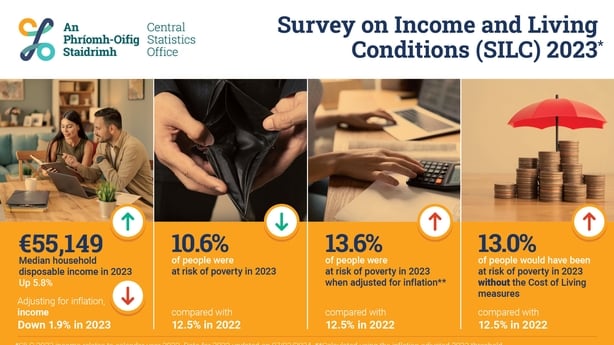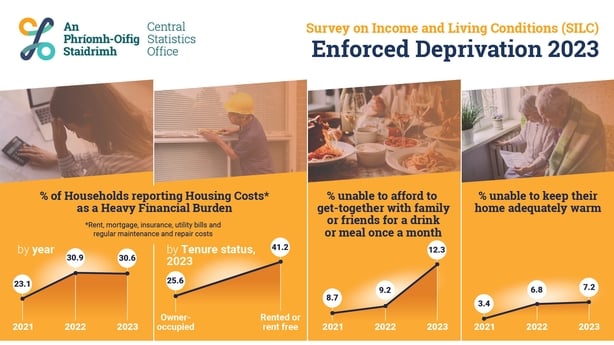New figures from the Central Statistics Office show that the risk of people falling into poverty was lower in 2023 compared to the previous year, but they also reveal an overall increase in the percentage of people experiencing deprivation.
The CSO's latest Survey on Income and Living Conditions shows that the at risk of poverty rate was 10.6% in 2023, down from 12.5% in 2022.
But the CSO added that if cost of living measures were excluded from income the at risk of poverty rate would have been 13% last year.
Cost of living measures introduced last year included energy credits as well as expanded fuel allowances, a double week payment for most people in receipt of a weekly social welfare payment and a double child benefit payment.

The CSO said its SILC 2023 survey showed an increase in household income from the previous year, but when adjusted for inflation real household income fell last year.
"The proportion of people at risk of poverty has fallen in 2023 compared with 2022, however, if cost of living measures paid to households in 2022 were excluded the at risk of poverty rate would have risen," it said.
"The publication also highlights the higher incidence of the risk of poverty amongst certain groups such as persons unable to work due to long-standing health problems; the unemployed; single-adult households; and those in rented accommodation," it added.
Today's figures show that the median nominal household disposable income in the 2023 Survey on Income and Living Conditions rose to €55,149, an increase of €3,005 (5.8%) from 2022.
But when adjusted for inflation real household income fell last year, falling by 1.9% to €50,162 - a decrease of €958 compared to the level in 2022.
Today's CSO figures show reveal that the richest 20% of people had 3.8 times the income of the poorest 20%.
The figures today also show an overall increase in the percentage of people experiencing deprivation in 2023.
They also highlight the higher incidence of deprivation amongst certain groups such as single-adult households with children, people unable to work due to long-standing health problems, the unemployed and those in rented accommodation.

People are defined as experiencing enforced deprivation if they live in a household that cannot afford two or more of the 11 basic deprivation items that are considered to be the norm for other households in society.
These items include being unable to afford to get-together with family or friends for a drink or meal once a month or being unable to afford to keep their home adequately warm.
Other indiciators include being unable to afford new clothes or a warm waterproof coat, unable to afford to replace any worn out furniture and unable to afford to buy presents for family or friends at least once a year.
The CSO said that 17.3% of people were experiencing enforced deprivation, compared with 16.6% in 2022 and 13.7% in 2021.
It noted that the biggest percentage point increase was for people unable to afford to get-together with family or friends for a drink or meal once a month, going from 9.2% in 2022 to 12.3% in 2023.
Social Justice Ireland said the figures give an insight into the ongoing impact of rising energy costs and inflation on poverty in Ireland.
Research and Policy Analyst, Susanne Rogers, said that without cost of living supports the at risk of poverty rate would have been 13%.
"While these measures supported vulnerable households, particular people aged over 65, the majority of these measures are one off in nature," she said.
"This makes today's figures very concerning and points to the long term economic and social impact on households as these temporary measures wind down."
"In addition, inflation has meant that the real value of household income has fallen, which is very concerning for households reliant on fixed incomes."

